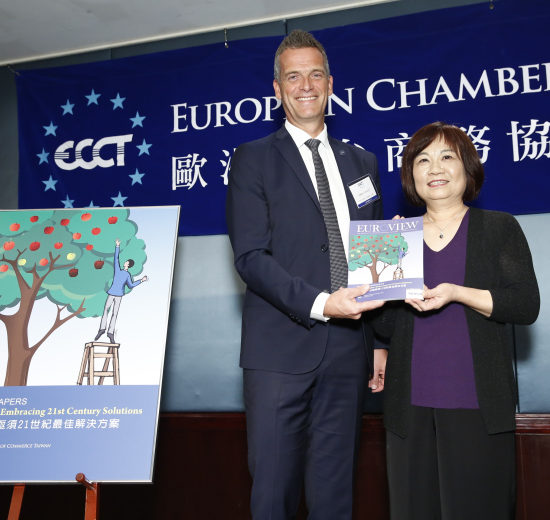2018 Tainan-ECCT Low Carbon Forum for Clean Air and Sustainability Solutions - 2018臺歐低碳永續與清淨城市論壇
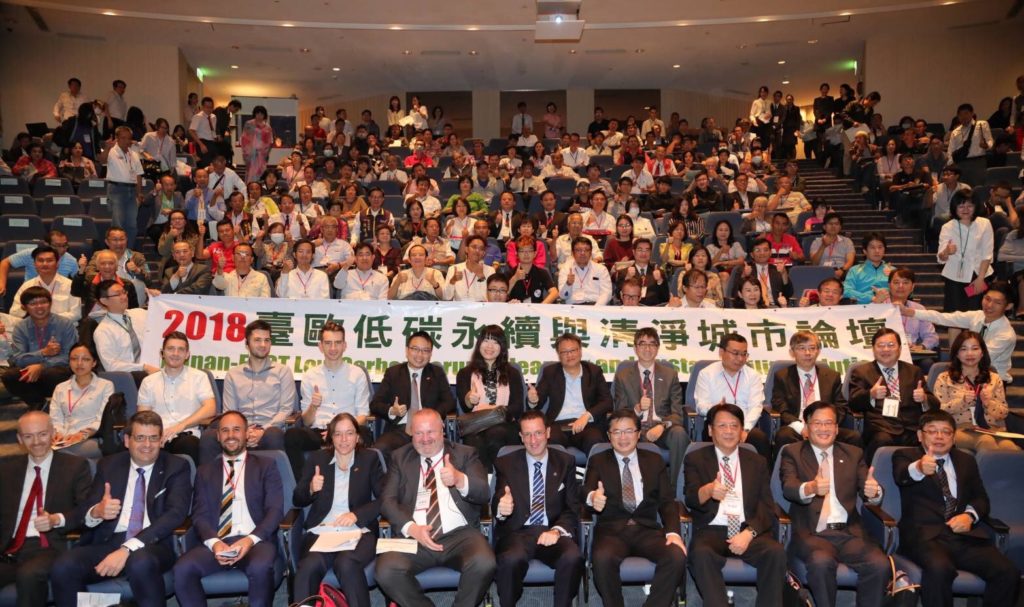
The ECCT’s Low Carbon Initiative arranged the forum with the theme “Clean Air and Sustainability Solutions” together with the Tainan City Government’s Environment Protection Bureau. The forum was part of the ECCT’s ongoing efforts as a nationwide organisation to foster cooperation with municipal governments around Taiwan. The ECCT has held annual events with the Tainan City Government since 2013. The aim of the forum was to promote energy-saving, carbon emission and air pollution mitigation strategies and reductions. The event brought together European policy makers, scholars and business leaders to address the challenges of creating a low-carbon economy for Tainan City.

Opening remarks given by Mr. Hung-Teh Tsai, Deputy Administrator of the Environmental Protection Agency; Mr. Meng-Yen Li, Acting Mayor of Tainan City; and Mr Freddie Höglund, CEO of ECCT.
Guests of honour
- Hung-Teh Tsai, Deputy Administrator of the Environmental Protection Agency
- Meng-Yen Li, Acting Mayor of Tainan City
- Freddie Hoglund, CEO, ECCT
Topic: Taiwan's air pollution law and new air quality control policy
Speaker: Wu Sheng-chung 吳盛忠 處長, Director-General, Department of Air Quality Protection and Noise Control, Environmental Protection Administration (EPA)
According to the speaker air quality in Taiwan is continuously improving and the EPAs goal is to improve air quality by 50% in 2019 compared to 2015. For example, in Taichung, the home of Taiwan’s largest coal-fired power plant, the average concentration of PM2.5 (fine particulate matter measuring 2.5 micrometres or smaller) has dropped from 23 micrograms per cubic metre in 2015 to 18.8 micrograms per cubic metre in October 2018. In order to manage PM2.5, we need to manage the causes (including ammonia emissions, ethylene, propylene, ethylbenzene and butadiene) as well as introduce modern technologies to reduce air pollution, CO2 emissions and noise pollution, such as promoting alternative fuels and modern noise control technology.
Topic: Cross-department air quality control for a clear and bright sky in Tainan City
Speaker: Lin Chien-san 林健三 局長, Director General, Environmental Protection Bureau, Tainan City Government
According to the speaker, 33% of the pollution in Tainan comes from the city itself, 34% from other cities and counties in Taiwan and 33% from outside of Taiwan. There are 1,290,000 motor cycles in Tainan while other pollution sources are construction sites and the food and beverage industry. The city government has placed controls on restaurants from dumping waste and grease into the sewage system. Another source of pollution is the burning of joss money in Tainan city’s 1,671 temples. The city displays air quality information at bus stops and other public displays. Tainan also hopes to introduce biomass technology.
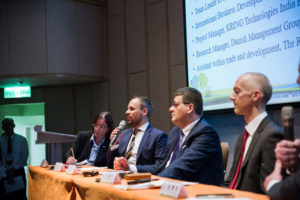
Session 1: European policies for cleaner air and sustainability
Moderator: Bodo Kretzschmar, LCI Steering Committee member
Sabrina Schmidt-Koschella, Deputy Director General from the German Institute in Taiwan outlined some clean air strategies employed in cities in Germany. Hamburg, the second largest city in Germany, for example has a green roof strategy, a tree planting drive, strategies to increasing bicycle traffic and expand public transport. It was the first German city to ban older diesel cars from two major streets. In 20 years, Hamburg will only allow bicycles and pedestrians in parts of the city centre. The largest source of nitrogen dioxide (NO2) air pollution in Germany is diesel cars. Other strategies include using big data and digitization or smart city solutions to improve traffic flows, manage road construction and promote park and ride systems.
Nicholas Enersen, Director from the Danish Trade Council, Taipei introduced some measures employed in Denmark. To reduce air pollution, there is a high (180%) tax on cars. Local municipalities have expanded infrastructures for bicycles. Copenhagen aims to become a carbon neutral city by 2025 and Denmark overall aims to be a carbon neutral country by 2050. 3,750 premature deaths annually are caused by exposure to air pollution in Denmark, which was equivalent to 7% of deaths in 2017. The main source of air pollution in Denmark is wood-burning stoves and boilers. ¼ homes in Denmark have wood-burning stoves. The next largest sources are vehicles, large energy production plants, ships and enterprises. Authorities are trying to forge a common agreement at the EU level to curb air pollution. In 1974, the Danish government passed the first regulation for managing pollution. The five focus areas for the Danish government are cleaner air in cities, cleaner wood burners, cleaner shipping, pushing international law on regulating the global shipping industry, environmentally-friendly technology and the build-up of knowledge.
Axel Limberg, Chief Representative and Executive Director from the German Trade Office outlined new environmental regulations and new business opportunities. German businesses accept the primacy of politics, support the development and adjustments of standards and are proactively looking to implement new methods to increase efficiencies. While the energy transition offers opportunities for economic growth, if it is not managed properly there will be disruptions that could cause economic losses. Therefore, it is imperative for the government to have a dialogue with industries before implementing a new framework. The new framework needs to be predictable to industry.
Michael Watters xxx title xxxxx from the British Office spoke about the circular economy and clean air in London and introduced its cycling super highway. By 2050, the population of London is predicted to exceed 11 million. There is too much rubbish in the city and the rate of recycling is low (41%). The city has set goals to increase recycling to 65% and become carbon neutral by 2050. It has also introduced a “Circular Economy Route Map” under which it has appointed three circular economy ambassadors and collaborates with others as a member of the Circular Economy 100 Network. Policies in this regard cover responsible procurement while knowledge and support is provided to business to implement circular economy business models. In terms of green transport the city is promoting walking and cycling, low emission bus zones, zero emission taxis, electric vehicles and implemented a “toxicity charge” for older vehicle when entering the city.
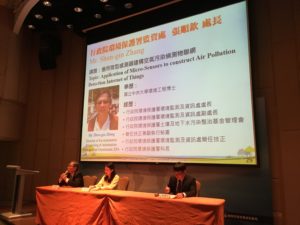
Session 2: Climate change and micro-monitoring towards air pollution
Moderator: Lin Jian-san林健三 Director-General, Environmental Protection Bureau, Tainan City Government
Cheng Fang-yi 鄭芳怡 副教授Assistant Professor from the Department of Atmospheric Sciences at National Central University spoke about weather patterns and how they influence pollution levels. She reiterated points made by previous speakers that the overall concentration of PM2.5 has been decreasing over recent years although Taiwan is sometimes subject to northeast monsoons which bring in trans-border air pollution.
Zhang Shun-gin 張順欽 處長, Director of Environmental Monitoring & Information Management Department at the EPA spoke about air-pollution detection IoT using low-cost sensors and the 4G network to transfer data from the sensors to central databases, where it is analysed using AI. When potential sources of pollution are detected, a notification is sent to officials. There is also a smart phone App for the public to participate in monitoring air quality. The speaker noted that an during emergency drill, when traffic was halted in Taipei City for 30 minutes, the PM2.5 level in the city dropped by 70%, indicating the degree of pollution that is attributed to vehicles on the streets of Taipei.
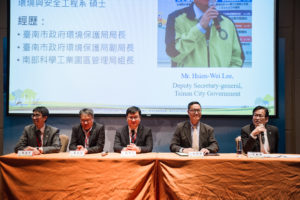
Session 3: Towards sustainable green cities: Clean energy applications and energy transformation
Moderator: Lee Hsien-wei 李賢衞 副秘書長 Deputy Secretary-General, Tainan City Government
Danny Yang 楊建新General Manager of Bosch Taiwan’s Automotive Original Equipment (SOE) Division, spoke about advanced automotive technology for reducing emissions in line with three major automotive development trends towards electrification, automation and connected vehicles. The trend towards electrification is being driven by legislation, new players in the market (such as Tesla) and urbanisation.
Jerry Chung 鍾智育, Business Development Director from Evonik gave examples of Evonik’s solutions for the circular economy. These include converting biogas to natural gas, using restaurant waste, city waste, leachates from incineration plants to produce biogas plant as well as solvent recovery in bulk chemicals, pharmaceuticals, electronics, and food & beverages.
Frank SL Tang湯守立 處長, Director of the Department of Planning for CPC Taiwan spoke about two most relevant government policies related to the energy transition: the goal to become nuclear-free by 2025, to increase natural gas as a source of energy production to 50% of capacity and the ban on the sales of fossil fuel motorcycles by 2035 and cars by 2040. Currently 49% of CPC’s revenue comes from selling petrol. Given the government’s push towards electrification, the company will need to transform. Part of its transition plan is natural gas and geothermal energy and to transform their petrol stations from providing petrol filling services to electric vehicle recharging. In this regard, the company has set up two demonstration petrol stations (in Tainan and Chiayi) where they provide both petrol and EV charging at the same station.
David Lin林日尉 企業發展總監, Business Development Director at Scania Taiwan noted that compared to diesel cars, biogas cars produces 90% less carbon emissions.
